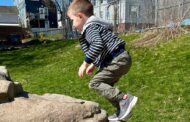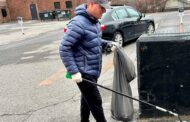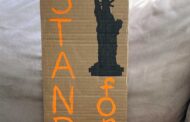Our Readers
Guest Opinion
By Charles Skold
We’re living in a strange time of self-isolation. Our favorite bars and hangout spots are closed. Public events are cancelled. Even our usual get-togethers with friends have been put on pause. “Social-distancing” is a lonely sport, for sure. But just because we’re apart doesn’t mean we’re alone. Our human desire to reach out is stronger than ever, and our communal response to this crisis shows just how inseparably connected we are. As we trudge on, here are three ways staying apart can bring us together more than ever.
Focus on our personal relationships. Many of us have been using our oddly emptied schedules to spend time connecting with friends and family virtually or by phone. Check in on Grandma and ask about her experience in the wartime effort. Call up an old friend and hear about everything new in their life. Schedule a video chat for your group of pals—whether you’re minutes or miles apart. Last week, my cousin created a “Sunday Dinner” Zoom call for our entire family, from Portland to Lincolnville to Las Vegas. What a treat for us all to be in the same “room” again talking over each other for an hour—something usually reserved for holidays. Take advantage of this free time—and modern communications—to invest in lifelong relationships.
Help others in our community. So many Mainers have responded to this crisis with a desire to help. I’ve seen Twitter threads sharing important information, NextDoor conversations about paying rent, and even uplifting Facebook groups like Quarantine Karaoke seeking to brighten each other’s days. One group mobilizing to help organize peer-to-peer assistance is Mainers Together, where I’ve been volunteering to help match community needs with neighbors who can assist (sign up at MainersTogether.com if you need help or can be a helper). Whether it’s giving money to someone who lost their job or getting groceries for a neighbor who can’t risk the exposure, there are many ways we can work together to help our community.
Prioritize the public good. Throughout this crisis, people have been putting the common interest above their own. Health care professionals, grocers, and other essential employees have been showing up to work at great personal risk. Everyone else has been staying home to slow the spread of the virus and to buy our hospitals more time. And while these sacrifices are noble, they aren’t enough on their own. This crisis proves that our health and safety is dependent on everyone else being healthy and safe, too. How is someone supposed to shelter in place if they don’t have a home? How can someone seek timely medical attention if they don’t have regular access to health care? How should someone stay home from work when they’re sick if their employer can dock their pay? We need to build a city and society that prioritizes the public good. Not only for the sake of charity to one another, but in recognition that a healthy society means greater safety for us all.
As we stay home and do our best to stay apart, remember we are not alone. We are in this together. Let’s keep calling our friends, helping our neighbors, and building a future that’s healthy and safe for all of us. This won’t be easy, but we’ll get through it together. We are more connected than we think. Staying apart, we are closer than we’ve ever been.
Charles Skold lives in Portland’s West End and is a candidate for State Representative in District 38 (CharlesForPortland.com). He holds a Master of Theological Studies and a Master in Public Administration from Harvard University.
Editor’s Note: As of the March 16th filing deadline, Michael Flaherty, Charles Skold, Barbara Wood, and Jordan Zema are running in the Democratic primary for Maine House of Representatives District 38 on June 9th, and there are no candidates on the ballot in the Republican primary.






How Staying Apart Could Bring Us Together
Our Readers
Guest Opinion
By Charles Skold
We’re living in a strange time of self-isolation. Our favorite bars and hangout spots are closed. Public events are cancelled. Even our usual get-togethers with friends have been put on pause. “Social-distancing” is a lonely sport, for sure. But just because we’re apart doesn’t mean we’re alone. Our human desire to reach out is stronger than ever, and our communal response to this crisis shows just how inseparably connected we are. As we trudge on, here are three ways staying apart can bring us together more than ever.
Focus on our personal relationships. Many of us have been using our oddly emptied schedules to spend time connecting with friends and family virtually or by phone. Check in on Grandma and ask about her experience in the wartime effort. Call up an old friend and hear about everything new in their life. Schedule a video chat for your group of pals—whether you’re minutes or miles apart. Last week, my cousin created a “Sunday Dinner” Zoom call for our entire family, from Portland to Lincolnville to Las Vegas. What a treat for us all to be in the same “room” again talking over each other for an hour—something usually reserved for holidays. Take advantage of this free time—and modern communications—to invest in lifelong relationships.
Help others in our community. So many Mainers have responded to this crisis with a desire to help. I’ve seen Twitter threads sharing important information, NextDoor conversations about paying rent, and even uplifting Facebook groups like Quarantine Karaoke seeking to brighten each other’s days. One group mobilizing to help organize peer-to-peer assistance is Mainers Together, where I’ve been volunteering to help match community needs with neighbors who can assist (sign up at MainersTogether.com if you need help or can be a helper). Whether it’s giving money to someone who lost their job or getting groceries for a neighbor who can’t risk the exposure, there are many ways we can work together to help our community.
Prioritize the public good. Throughout this crisis, people have been putting the common interest above their own. Health care professionals, grocers, and other essential employees have been showing up to work at great personal risk. Everyone else has been staying home to slow the spread of the virus and to buy our hospitals more time. And while these sacrifices are noble, they aren’t enough on their own. This crisis proves that our health and safety is dependent on everyone else being healthy and safe, too. How is someone supposed to shelter in place if they don’t have a home? How can someone seek timely medical attention if they don’t have regular access to health care? How should someone stay home from work when they’re sick if their employer can dock their pay? We need to build a city and society that prioritizes the public good. Not only for the sake of charity to one another, but in recognition that a healthy society means greater safety for us all.
As we stay home and do our best to stay apart, remember we are not alone. We are in this together. Let’s keep calling our friends, helping our neighbors, and building a future that’s healthy and safe for all of us. This won’t be easy, but we’ll get through it together. We are more connected than we think. Staying apart, we are closer than we’ve ever been.
Charles Skold lives in Portland’s West End and is a candidate for State Representative in District 38 (CharlesForPortland.com). He holds a Master of Theological Studies and a Master in Public Administration from Harvard University.
Editor’s Note: As of the March 16th filing deadline, Michael Flaherty, Charles Skold, Barbara Wood, and Jordan Zema are running in the Democratic primary for Maine House of Representatives District 38 on June 9th, and there are no candidates on the ballot in the Republican primary.